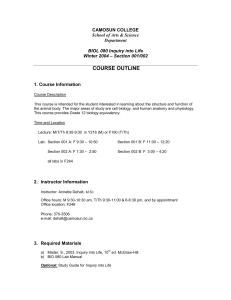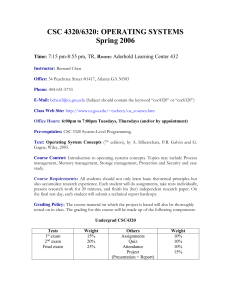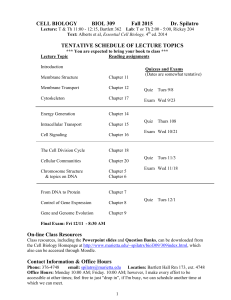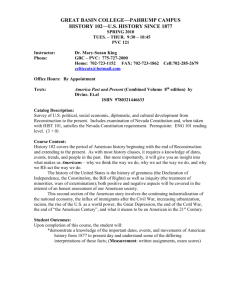Operations Management - the Sorrell College of Business at Troy
advertisement
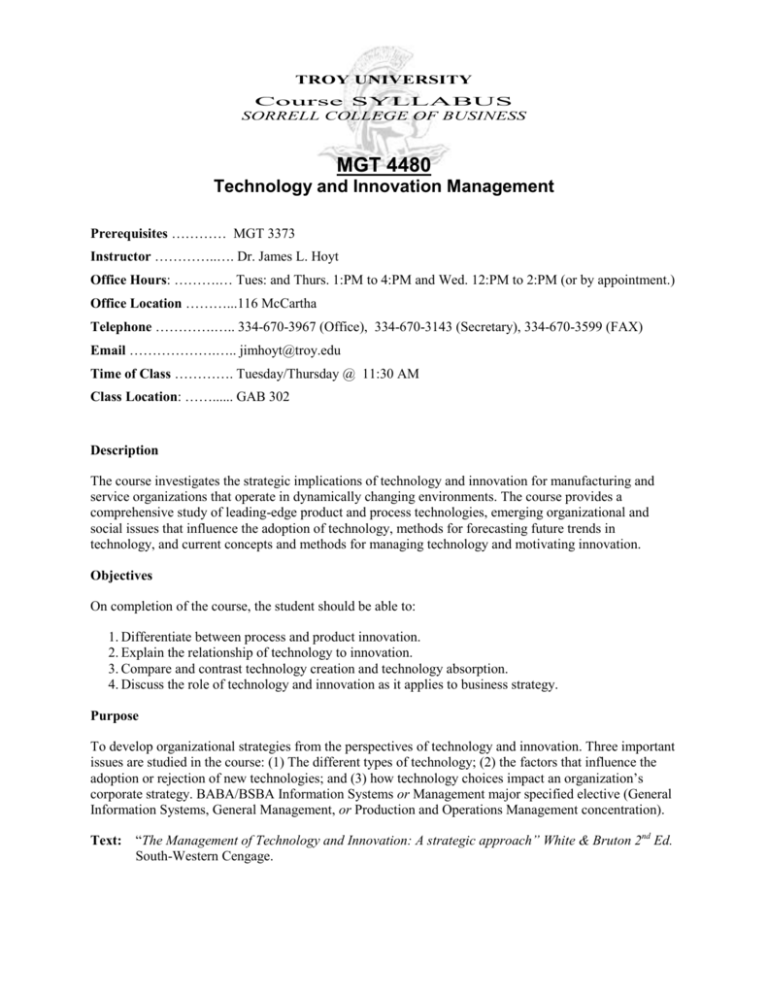
TROY UNIVERSITY Course SYLLABUS SORRELL COLLEGE OF BUSINESS MGT 4480 Technology and Innovation Management Prerequisites ………… MGT 3373 Instructor …………..…. Dr. James L. Hoyt Office Hours: ……….… Tues: and Thurs. 1:PM to 4:PM and Wed. 12:PM to 2:PM (or by appointment.) Office Location ………...116 McCartha Telephone ………….….. 334-670-3967 (Office), 334-670-3143 (Secretary), 334-670-3599 (FAX) Email ……………….….. jimhoyt@troy.edu Time of Class …………. Tuesday/Thursday @ 11:30 AM Class Location: ……...... GAB 302 Description The course investigates the strategic implications of technology and innovation for manufacturing and service organizations that operate in dynamically changing environments. The course provides a comprehensive study of leading-edge product and process technologies, emerging organizational and social issues that influence the adoption of technology, methods for forecasting future trends in technology, and current concepts and methods for managing technology and motivating innovation. Objectives On completion of the course, the student should be able to: 1. Differentiate between process and product innovation. 2. Explain the relationship of technology to innovation. 3. Compare and contrast technology creation and technology absorption. 4. Discuss the role of technology and innovation as it applies to business strategy. Purpose To develop organizational strategies from the perspectives of technology and innovation. Three important issues are studied in the course: (1) The different types of technology; (2) the factors that influence the adoption or rejection of new technologies; and (3) how technology choices impact an organization’s corporate strategy. BABA/BSBA Information Systems or Management major specified elective (General Information Systems, General Management, or Production and Operations Management concentration). Text: “The Management of Technology and Innovation: A strategic approach” White & Bruton 2nd Ed. South-Western Cengage. Grading Methods: Two Midterm Exams ……………………………………….. 100 Points (each) Homework Assignments ……………………………………. 25 Points (each) Class Quizzes …………………………………………………10 points (per quiz)\\ Case Analysis ………………………………………………… 25 Points each Final Exam (see below) Grade Structure: A B C D F 90-100% 80-89% 70-79% 60-69% 0-59% No tests will be dropped, all exams will be given equal emphasis, and no additional assignments will be given to improve final grades. All grades will be “earned” by the student. If you need a particular grade in this class to graduate, keep a scholarship, be eligible for sports (or similar situations), then you will need to score high enough to earn the grade that you need. If you are having problems with this course you need to discuss this issue with the instructor at the beginning of the semester and not during finals week. It is the responsibility of the student to earn the needed grade for this class. Finally, students should have a contingency plan for computer failure that includes completing homework assignments in advance of the due date. Quiz Policy: Quizzes will be administered randomly throughout the semester. Questions will be projected onto an overhead screen and students will record their answers on a 4” X 5” answer sheet. When computing the overall average, the two lowest quiz grades will be dropped. This procedure will apply to all forms of absences (excused or unexcused). Therefore, any student who misses a quiz will have the option of dropping up to two untaken tests. Midterm Exam Policy: Make-up exams will be given only for documented, approved absences. (See ATTENDANCE POLICY below). Make up exams are administered only to students who have received approval from the instructor prior to the test date. The make-up exam must be taken within one week of the student's return to class. Make-ups will be different from exams given in class. A grade of zero will be assigned for an exam missed due to an unexcused absence. Quiz and Exam Administration: No electronic devices other than a simple calculator will be allowed during an exam. Cell phones and translators are not acceptable calculators and are not permitted. Students will be allowed to use one 8 ½ X 11 “study guide” for each mid term exam (one side only). (Study sheets will not be permitted for quizzes . This study guide will contain any information that the student feels will help him/her on the exam. The sheet must be typed or handwritten. Xerox copies, printer copies or photo copies of presentation material are not permitted. Final Exam Policy: The final exam is designed to test the students overall understanding of the course material. It will consist of a very short case with approximately seven TIM questions designed to test the student’s ability to apply the concepts of material learned in the course. The grade for this exam will be applied as follows: The exam will begin with a short scenario and seven questions relating to that scenario will be given. Students who answer 3 to 4 questions correctly will see no change in their overall average. For each incorrect answer after four, one point will be deducted from the student’s overall average. (Example: five incorrect answers = a one point reduction in the average). Conversely, for each correct answer over five, the overall average will be increased by one point. Failure to take the final exam will result in a 9 point deduction from the students overall grade average. Course Content: The technology environment Innovation as a component of strategy Technology Diffusion Technology appropriation and implementation Process Innovation and Value Chains Technology Intelligence Technology as a component of Strategy Appropriation of technology Comparison of product and process technologies Product and technology lifecycles Strategic Decisions based on technology. Classroom Administration: Students are expected to”: 1. Attend all scheduled classes. Students who arrive at class after roll call may be counted absent 2. Be responsible for all instructions and assignments given in class as well as for the supporting textbook content. 3. Read the text. Read the textbook material before the lecture covering that material. This leads to a better understanding of the lecture (or lab) as well as the opportunity to ask questions about material(s) in the text that were perhaps unclear or not understood. 4. Hand in assignments on the assigned due date during roll call. See homework policy. 5. Neither hats nor sunglasses are to be worn in the classroom. 6. No food, tobacco products, nor drinks are allowed in the classroom. 7. Exams, except the final, will be temporarily returned and reviewed. If the student needs to spend more time reviewing or questioning the grading of the exam he/she may see the professor during office hours. 8. Students who continually engage in disruptive behavior (example: excessive talking) will receive one warning with no penalty. For each successive warning a penalty of one percentage point will be deducted from the students overall average. General Support Services: The computer labs in 215 Bibb Graves and 249 Bibb Graves are available for student use. Additional Services: AMERICANS WITH DISABILITIES ACT: Any student whose disabilities fall within ADA must inform the instructor at the beginning of the term of any special needs or equipment necessary to accomplish the requirements for this course. Students who have or may be dealing with a disability or learning difficulty should speak with the instructor, contact the Office of Adaptive Needs Program (Trojan Center 215) or call 6703220/3221. Various accommodations are available through the Adaptive Needs Program. The faculty in the School of Business makes every effort to accommodate unique and special needs of students with respect to speech, hearing, vision, seating, or other possible disabling conditions. Please notify the instructor as soon as possible of requested accommodations or ways to help. Attendance Policy: 1. Class Roll: Class roll will be taken at the beginning of the class session. A student who arrives after her/his name is called may be marked absent. 2. Attendance is mandatory. If a student misses a class, it is his/her responsibility to obtain all information and materials presented (including materials covered, handouts, skills learned, and homework assignments) during his/her absence. 3. Excused absences: Excused absences are defined in the following manner: a. Professor was informed prior to the absence. b. Professor determines that the absence is excused. c. Excused absence will be determined according to the following criteria: Participation in a documented official university function that does not permit the student’s class attendance (e.g., participation in athletic events, field trips, etc.) Severe illness (this does not include scheduled medical appointments nor driving someone else to doctor), a hospital stay, or a doctor's excuse saying that it is impossible for student to attend class(es) Death of immediate family member (grandparent, parent, sibling, or child) Appearance in court Personal situations that are approved by the professor in advance of the time the student is to be absent. Incomplete Work Policy: Any incomplete work at the end of the term will not be accepted unless the student can provide acceptable and clear documentation prior to grades being submitted to the Registrar. Cheating Policy: If you are caught cheating, you will get a Handbook, 1998-1999" pp. 56-57. Plagiarism is the act of stealing and passing off (the ideas or words of another) as one’s own or to commit literary theft: present as new and original an idea or product derived from an existing source (Webster’s New Collegiate Dictionary). Plagiarism will cause a student to get a course grade of “F”. According to the TSU ORACLE: Student Handbook, 1998-99, pp. 52, one definition of misconduct is: “Dishonesty, such as cheating, plagiarism...”. The ORACLE states on pp. 56 under the Academic Code sub-heading that: “A student is subject to disciplinary action:” “Where the work affects or might affect a student’s grade, credit, or status in the university, a student represents to be his or her own any work which is not the product of his or her own study and efforts”. The penalty for such misconduct may be (pp. 56) “A student’s grade in the course or on the examination affected by the misconduct may be reduced to any extent, including a reduction to failure.” A student may be suspended from the university for a specific or an indefinite period. pp. 56-57. Schedule of Classes for TIM Daily Assignments: Date Topic Chapter Jan 6 Introduction to the course Jan 11 Productivity and Competitiveness 2 Jan 13, 18 Technology Change 3, 4 Jan 20, 25 Technology and Competition 5 Feb 1, 3 Process Innovation 6 Feb, 8, 10 Technology Intelligence 7 Feb, 15 Exam #1 Feb 17, 22 Technology Strategy 8, 9 Feb 24 Appropriation of Technology 10 Mar 1, 3 New Product Deployment 11 Mar 7-14 Spring Break Mar 15, 17 Technology in the Value Chain 12 Mar 22, 24 Organizing for Innovation 13 Mar 29, 31 Intellectual Property Strategy 14 Apr 5 Field trip to Pioneer Museum Apr 7, 12, Project Valuation Apr 14, 19 Project Management April 21 Exam #2 Apr 26 Wrap - Up May 4 Final Exam …. 2:PM to 4:PM 15


